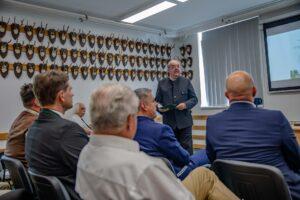Future wildlife management is based on innovative knowledge
Sustainable wildlife management is a fundamental requirement today, which requires high-quality training and modern educational institutions – said Péter Zambó, State Secretary for Forests and Land Affairs of the Ministry of Agriculture on Monday, at the ceremonial handover of the renovated building complex of the Hungarian University of Agricultural and Life Sciences (MATE) in Gödöllő.

(Photo: AM/Tibor Vermes)
In his welcome address, he emphasized that a new chapter in the future of an institution is opening, which simultaneously shapes knowledge, attitude and responsibility. They train professionals who not only think in their fields, but also in landscape systems, social processes and long-term ecological effects. The State Secretary highlighted the importance of professional traditions, remembering the university’s excellent professionals who, with their life’s work, set an example of humility towards science and nature.
Péter Zambó pointed out that agriculture, forestry and wildlife management, and nature conservation within them, are parts of the same ecological system
They seek answers to the needs of the same landscape, the same climate, and often the same communities. Future wildlife management cannot be successful without taking into account the change in habitats or the increase in society’s recreational needs, which is increasingly increasing human presence in nature. Sustainability is therefore not a static goal, but a constantly retuned balance – the State Secretary underlined. He added that achieving this balance requires adaptability, up-to-date knowledge and long-term thinking. Universities have a key role in this: not only by transferring new knowledge, but also by being able to teach complexity. The MATE Institute of Wildlife Management and Nature Conservation, as the country’s largest specialized higher education institution and research center, provides modern infrastructural conditions for students and researchers, maintaining the high standard of international scientific work and practical training.
AM
Related news
The government provides significant funding to support the development of crop dryers
🎧 Hallgasd a cikket: Lejátszás Szünet Folytatás Leállítás Nyelv: Auto…
Read more >Agricultural vocational training also places great emphasis on irrigation development
🎧 Hallgasd a cikket: Lejátszás Szünet Folytatás Leállítás Nyelv: Auto…
Read more >Related news
Lidl guarantees fairer prices for cocoa farmers
🎧 Hallgasd a cikket: Lejátszás Szünet Folytatás Leállítás Nyelv: Auto…
Read more >









